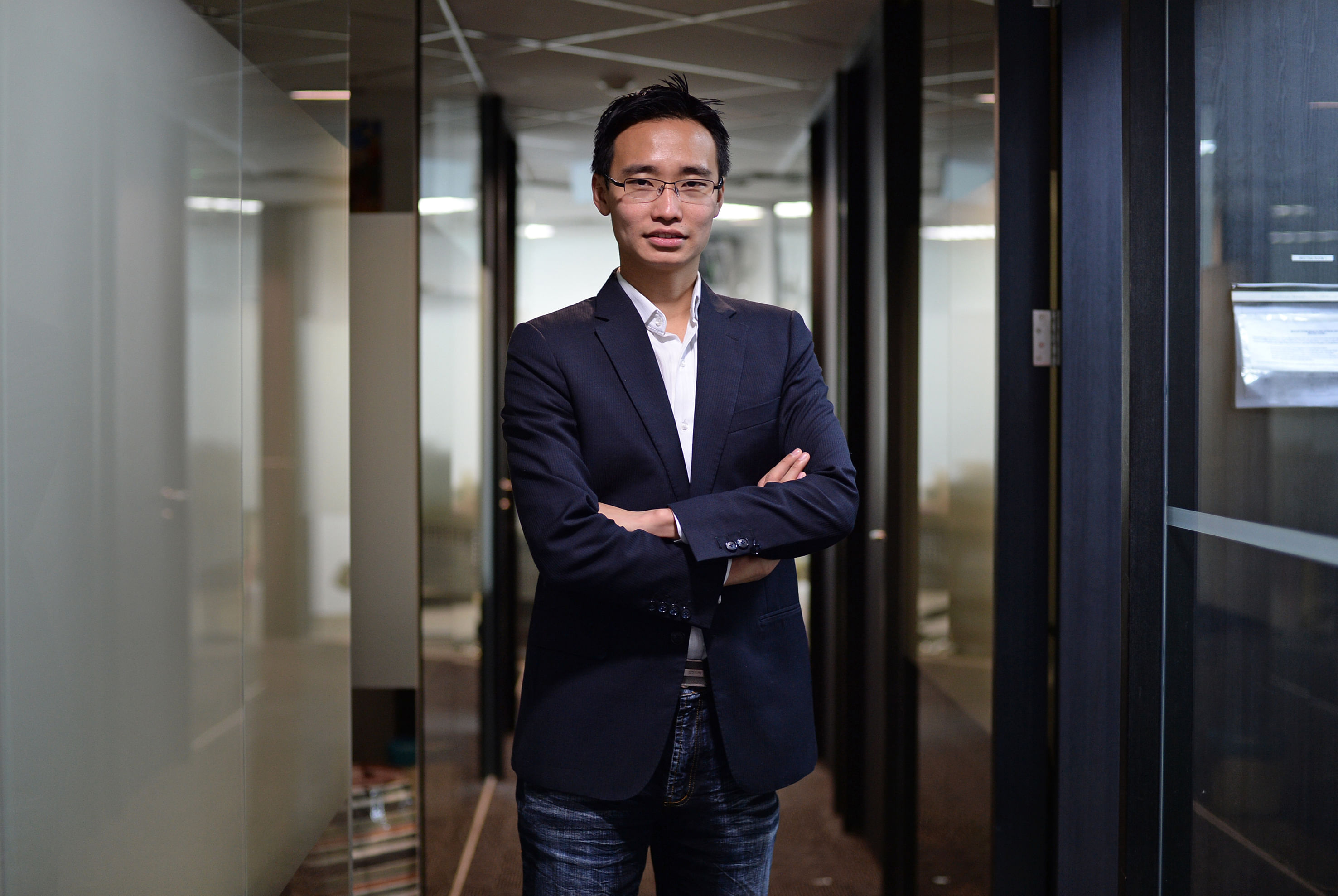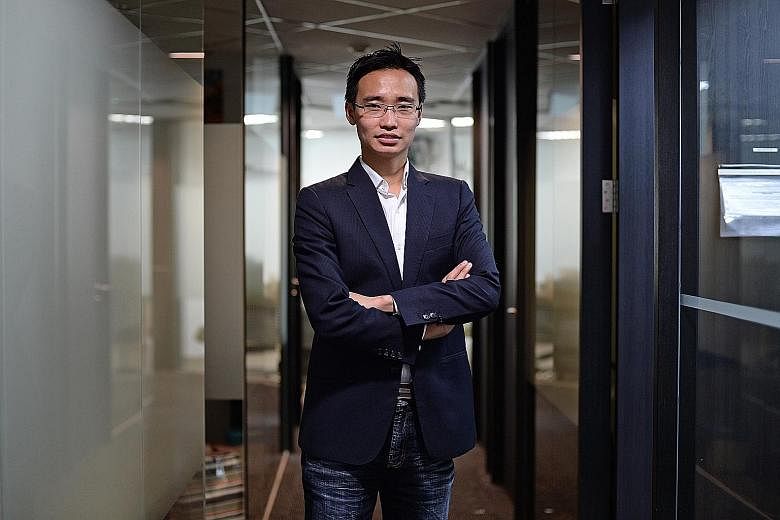Being on the cusp of an illustrious career in consulting and finance is not something many would leave behind, but Mr Kelvin Teo did just that to further his studies and chase his dream of becoming a finance entrepreneur.
Mr Teo held a coveted role as an operating professional at KKR Capstone - an independent team that works exclusively with global investment firm KKR to assess operations opportunities for investment. Before that, he was a senior consultant at industry leaders McKinsey and Accenture.
The itch to broaden his horizons led Mr Teo, 29, to pursue a Master of Business Administration (MBA) at Harvard Business School even though his career was going swimmingly.
"A lot of friends and colleagues urged me to think twice about the MBA, as it was a step back, and KKR and McKinsey were lucrative jobs. But it's important to follow your passion," says Mr Teo, who was also a valedictorian of National University of Singapore (NUS) Business School.
It paid off as his time in Harvard led him to the idea of peer-to-peer lending in the United States.
Mr Teo used to invest in stocks because he had ambitions of beating the market "but it's very time-consuming, and you're not creating a lot of impact on society".
So he went on a search for shorter-term investments that he could make an impact and get good returns with.
"I brought the business model back because it served my own investment needs," says Mr Teo, who was inspired to co-found Singapore-based firm Funding Societies.
Mr Teo has invested at least $100,000 in the firm, which helps finance small- and medium-sized enterprises (SMEs) across various sectors through business loans. It was incorporated in February this year.
People can start investing in SMEs through loans, with a minimum sum of $1,000.
Each loan can be as low as $100, so with the minimum $1,000, investors can diversify across as many as 10 loans.
-
Worst and best bets
-
Q What has been your biggest investing mistake?
A Hesitation. I find that with myself and a lot of friends I've spoken to, when I'm not sure about the investment and don't want to commit the time to find out, a lot of money ends up sitting in the savings account, which generates 0.5 per cent or less.
I've had a lot of missed opportunities because I hesitated, from when I was younger and buying stocks, or other alternative investments now.
If you don't even try to invest, you don't even learn anything and the longer you wait, the worse it is, so hesitation is really the enemy.
Q And what has been your best investment move?
A Before Funding Societies, the best investments were in the companies I was working for or stock options I was given.
At the end of the day, it's important to understand what you're investing in.
But now that I've access to alternative investments because of Funding Societies, I see the company as the best investment I've made. It has generated returns from a financial perspective and from a value perspective, as I see we're really making an impact.
The repayment of loans has started and we've received about 50 repayments totalling $2.6 million. We currently have a perfect track record, even though it's a short record. It's a good sign as other platforms have seen loan defaults when they started.
The alternative investments I've made through the company have made a return of about 10 per cent, based on simple interest. I want to add that a lot of investments funds are very sneaky on how they quote you on rates - like simple interest that is converted to effective interest, for me, would be about 20 per cent, but just simple interest is actually 10 per cent.
Rachael Boon
Funding Societies assesses the credit-worthiness of companies and sets an interest rate according to the risk factor.
"We set the bar as low as possible so everyone can access it. At $1,000, we're even losing a bit of money, but our vision is to give casual investors a chance to invest," says Mr Teo.
The firm engaged an escrow agency registered with the Monetary Authority of Singapore, to conduct checks, like how banks do, to protect against money laundering and to handle funds from investors and borrowers professionally.
Funding Societies has yet to break even as it is a capital-intensive business, adds Mr Teo, but it has crowdfunded more than $2.6 million in loans to 32 SMEs.
It has also received more than $20 million worth of applications, but the firm goes through each to find the best.
Mr Teo says: "I always ask, how can I help a lot of SMEs to grow so I can create more jobs? Can I see the companies that we lend money to eventually grow bigger?"
But it wasn't always easy when the lure of the corporate world surrounded him.
"KKR is a very prestigious brand that arguably started the private equity industry. A lot of people in Harvard are trying to get into KKR, and I was there, so I was asked why I took a step down to do an MBA.
"But the question is, 'What is your passion in life?' Private equity is not necessarily very fulfilling because a large part of it is giving cash to the company. Then it runs by itself and maybe you give some advice."
Mr Teo says firmly he wants to be more hands on and help smaller companies "because they are the ones who need it, not those that private equity has invested in".
"That's why we searched for business models that could help SMEs and I feel a lot more fulfilled."
Q Moneywise, what were your growing-up years like?
A I came to Singapore from Malaysia at 15 on a scholarship. My parents - my mum's a school teacher, and dad, a manager at an oil palm plantation - and elder brother enjoy stock investing. I also have a younger sister.
Coming to Singapore was a turning point for me. Everything was at least 21/2 times more expensive, and since then, I decided not to take money from my family and to support myself.
I'd focus on getting study awards and part-time jobs during holidays.
Q How did you get interested in investing?
A It was my second year in university and GIC came to NUS to pick the top students and put them through a short programme that introduced us to investing and asset classes.

I wanted to beat the market and earn a lot then, but over the years, my idea of investing has changed.
At McKinsey, where I strategised and implemented ideas and met people on the ground and in senior management of firms, I learnt bad investments hurt those on the ground and the management doesn't see that.
I started to move towards making strategic investments to make an impact on society, or at least on a firm.
When I moved to KKR, it was not just about investing in a company, but how I could help it be a better company so the employees are happier.
Q Describe your investing strategy.
A I'm a believer of value and growth investing - something that makes an impact. It's hard to time the market, but not too difficult to assess the quality of a business.
I'm prudent but also aggressive. I'm prudent as I diversify, and investing but not breaking the bank to do so.
Once I'm committed to a philosophy, I'm aggressive as I don't hesitate to invest. When you hesitate, you miss opportunities.
I also believe in investing in things that I understand well. I previously invested heavily into tech and consulting stocks like Accenture, when it launched full-suite services, at about US$55 per share and it's now about US$103.
Also Facebook when it entered the mobile scene, at about US$34 and it's now about US$106. Both stocks required years of holding.
Q What's in your portfolio?
A About 70 per cent are business loans that I've put on the platform, and 30 per cent is in investments funds - which I invested in when I was much younger and can't get out of because of the lock-in period.
The investment funds are in Asia's growth sectors, and both in equities and bonds. If you get out of the investment in less than five years, you just break even, which is worse than just putting your money in the bank. This part of the portfolio is about $15,000 with 5 per cent returns.
I also bought a residential property, a two-bedroom condo on the city fringe, for about $1 million, to rent.
As I've recently bought that and am saving up for marriage, I'm exploring more alternative investments with shorter holding periods or more liquidity, like personal loans at American firm Lending Club and business loans in Singapore.
Q What is one meaningful thing you've done with your money?
A For a few years now, I have been a supporter of Compassion International, which sponsors children in undeveloped countries, and hopefully help them out of poverty through nourishment and education.
I dedicate 3 per cent of my monthly income to that. It's satisfying to see your money making a sustainable impact.
Q What plans do you have for your money?
A Realistically, it'd go to my MBA student loan, a price to pay for not returning to consulting or private equity.
I hope to be more involved in helping kids with their education, and eventually dedicating 10 per cent of my monthly income to charities which help to better education.
I was fortunate to be given a scholarship to study in Singapore when I was younger. It made a huge difference in my life and I'd like to pay it forward.
Q What's the most extravagant thing you have done?
A Does getting an engagement ring for my fiancee count? It's the most expensive purchase but besides that, the most extravagant was starting my company with just a dream and a little cash.
It's one of the most daring moves I've made because when I started, it was a new industry and I only had passion. I'm really glad things have paid off so far.
Q What are your immediate investment plans?
A I want to double down on the investments on the platform. I do see it as a good source of investments if you manage it well and diversify sufficiently.
Q Home is now...
A I rent a room in a Housing Board flat in the east, as I don't need a lot of space for myself.


